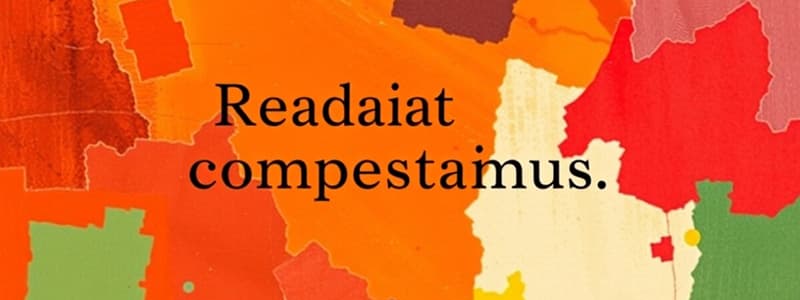Podcast
Questions and Answers
What does the term 'formal lexical' primarily refer to?
What does the term 'formal lexical' primarily refer to?
- Technical vocabulary used in academic or professional contexts. (correct)
- Regional dialects that are commonly used in everyday communication.
- Simplistic language aimed at a young audience.
- Slang and colloquial expressions used in casual speech.
Which of the following is an example of formal vocabulary?
Which of the following is an example of formal vocabulary?
- Utilize (correct)
- Wanna
- Kids
- Gonna
Which sentence correctly uses formal grammar?
Which sentence correctly uses formal grammar?
- They was going to the store.
- She don’t like the idea.
- He runs quicker than her.
- It is important that he understands the material. (correct)
Identify the incorrect use of a formal lexical choice in this sentence: 'The committee made a decision, which was of great importance.'
Identify the incorrect use of a formal lexical choice in this sentence: 'The committee made a decision, which was of great importance.'
In an academic essay, which phrase would be most appropriate to use for a formal tone?
In an academic essay, which phrase would be most appropriate to use for a formal tone?
Which word best replaces 'get' in a formal context?
Which word best replaces 'get' in a formal context?
Choose the sentence that uses formal vocabulary correctly.
Choose the sentence that uses formal vocabulary correctly.
Which of the following expressions is most appropriate for a formal setting?
Which of the following expressions is most appropriate for a formal setting?
Identify the sentence that adheres to formal grammar rules.
Identify the sentence that adheres to formal grammar rules.
Which option demonstrates formal expression in writing?
Which option demonstrates formal expression in writing?
Flashcards
Grade level
Grade level
The educational level of students in a class or school
English Subject
English Subject
The subject dealing with the English Language
Reading Comprehension
Reading Comprehension
The ability to understand what you read
Formal Lexical
Formal Lexical
Signup and view all the flashcards
Multiple Choice Questions (MCQs)
Multiple Choice Questions (MCQs)
Signup and view all the flashcards
Vocabulary
Vocabulary
Signup and view all the flashcards
Grammar
Grammar
Signup and view all the flashcards
Formal Writing
Formal Writing
Signup and view all the flashcards
Study Notes
Reading Comprehension
- Focus on identifying main ideas, supporting details, and author's purpose in texts.
- Skimming and scanning techniques are essential for efficiently locating information.
- Analyze text structure, recognizing different organisational patterns (e.g., chronological, cause-and-effect).
- Inferring meaning from context is crucial for understanding vocabulary and underlying concepts.
- Distinguish between fact and opinion, and identify any biases the author might have.
- Determine the tone and mood of the text to understand the author's attitude.
- Practice summarizing passages to demonstrate comprehension.
Formal Lexical (Vocabulary & Grammar)
- Focus on understanding and using formal vocabulary in academic and professional contexts.
- Improve accuracy in word choice to express ideas precisely.
- Learn the nuances of words with similar meanings.
- Understand and apply grammatical rules related to sentence structure, tense usage, and parts of speech.
- Improve clarity and precision in written and spoken communication.
- Recognize and avoid common grammatical errors.
- Formal lexical items relate to academic style and tone.
Sample Multiple Choice Questions (MCQs) - Reading Comprehension
- Question 1: "The passage primarily discusses..."
- The social impact of technology
- The history of communication
- The scientific advancements needed for future communications
- The political implications of communication
- Question 2: "According to the text, the primary cause of..."
- A natural phenomenon
- A series of events
- An intentional action
- A long-range consequence
- Question 3: "What can be inferred from the author's description of..."
- The text states explicitly what was implied
- The text implies an underlying meaning about something
- A description of something specific
- The underlying attitude of the writer on a particular topic
Sample Multiple Choice Questions (MCQs) - Formal Lexical
-
Question 4: Choose the synonym for 'audacious' from the options:
-
timid
-
cautious
-
bold
-
hesitant
-
Question 5: Identify the correct sentence using appropriate formal vocabulary:
-
"The book was really great."
-
"The author's prose was quite compelling."
-
"The characters were cool."
-
"The book was entertaining."
-
Question 6: Which is the correct tense for the following sentence: "The scientist ______ a groundbreaking discovery last year."
-
made
-
has made
-
will make
-
was making
-
Question 7: Choose the best formal alternative for "The movie was good.":
-
The film was of exceptional quality and compelling narrative.
-
The movie was okay
-
The film was very engaging.
-
The movie wasn't bad
-
Question 8: Which sentence demonstrates precise word choice?
-
The presentation was okay and interesting.
-
The presentation was well thought out and insightful.
-
The presentation was interesting enough.
-
The presentation was entertaining
-
Question 9: What does 'ephemeral' mean?
-
Something that is fleeting and short-lived.
-
Something that is permanent.
-
Something that is complex.
-
Something that is easy to understand.
-
Question 10: Select the most formal replacement for 'really':
-
Genuinely
-
Truly
-
Quite
-
Very
Studying That Suits You
Use AI to generate personalized quizzes and flashcards to suit your learning preferences.
Description
This quiz focuses on essential skills for reading comprehension and formal vocabulary enhancement. Participants will learn techniques for identifying main ideas, analyzing text structure, and distinguishing facts from opinions. Additionally, emphasis on using formal vocabulary in academic contexts is covered to improve precision in expression.




